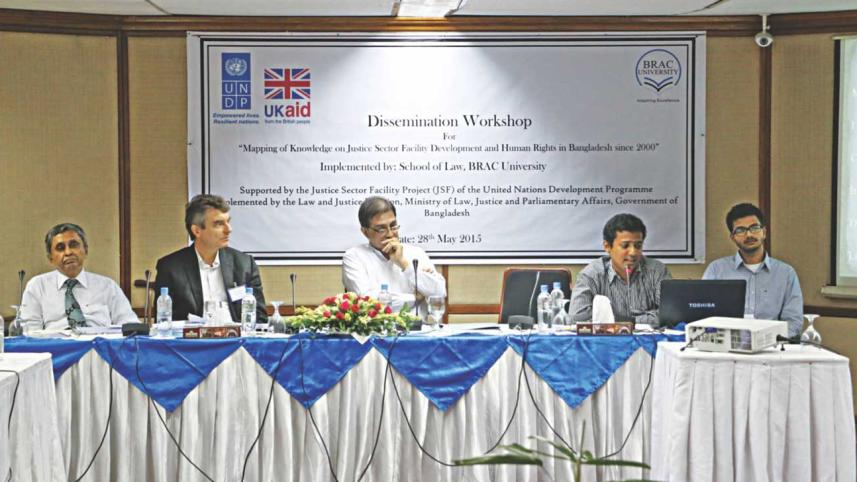To assess the growth of justice sector

Since October 2014 the School of Law, BRAC University has engaged on a project entitled “Mapping of Knowledge on Projects Undertaken on Justice Sector Facility Development and Human Rights in Bangladesh”. This is supported by the Justice Sector Facility Project of the United Nations Development Programme, implemented by the Ministry of Law, Justice and Parliamentary Affairs, Government of Bangladesh and co-funded by UKaid.
The objective of this project is to produce an index of projects/reports on numerous facets of the growth of the justice sector and access to justice and human rights in Bangladesh, accomplished since 2000 in eighteen distinct sub-sectors namely: Children Issues, Courts and Administration of Justice, Gender Issues, Human Trafficking, Indigenous Communities, Informal Justice and ADR, Labour Issues, Law Enforcing Agencies excluding Police, Miscellaneous, Persons with Disabilities, Police, Preventive Detention, Prison Administration, Refugees and Undocumented Foreigners, Religious Minorities, Socially Marginalised Sections of the Population, Support to Witnesses and Victims of Crimes, and Torture.
On 28 May 2015, the School of Law, BRAC University arranged a “Dissemination Workshop” to address the final report of the project at the BRAC Centre Inn, Mohakhali, Dhaka.The programme was inaugurated with a welcome address by Dr. Shahdeen Malik, Director, School of Law, where he praised the Project Implementing Team for their in-depth work, which would pave for improved interventions in the justice sector.
Following this, Dr. Md. Rizwanul Islam, Assistant Professor, School of Law, the Focal Person for the Project articulated his conclusions on certain sub-sectors, namely; Gender Issues, Indigenous Communities, Informal Justice and ADR, Law Enforcement Agencies excluding Police, Support to Witnesses and Victims of Crimes. Among these, Dr. Islam suggested that the reforms in certain laws require further thought.
He explained that in case of family law, there is no major reform in Bangladesh. Existing reforms have merely centred on domestic violence and violence against women. Dr. Islam discussed that the reforms suggested by some reports are probably not as thoroughly charted as they could be, for instance, many contend that second marriage should be nullified, to which he purported that due to the lack of easy access to marriage registry, the verification of one's marital status may not be straight forward, thereby creating many victims who are unaware of a first marriage. Consequently, the banning of second marriages without changes in the registry system could produce unintended consequences.
Furthermore, Mr. Farhaan Uddin Ahmed, Research Assistant in the Project tendered on two sub-sectors, namely; Courts and Administration of Justice and Police in Bangladesh. Both Mr. Ahmed and Dr. Islam examined the lacuna, overlaps and stipulated proposals for further analysis and formulation of policies for the appropriate sub-sectors. Afterwards, Mr. Sanwar Hossain, also a Research Assistant shared the experience of the Project Implementing Team in respect of the collection of materials and communication with the stakeholders.
Subsequently, Mr. Christian Eldon, Chief Technical Advisor, Justice Sector Facility Project of the UNDP delineated the Project's importance to secure productive expansion of the justice sector. Thereafter, Dr. M. Shah Alam,Member, Law Commission of Bangladesh, delivered comprehensive intuitions on research in the justice and human rights sector, and valued the effort of the team.
The floor was next opened for discussion, where Dr. Ridwanul Haque, Professor, Department of Law, University of Dhaka raised some perceptive questions and offered contemplative observations. Delegates from several organisations similarly raised questions, which were appositely replied and taken into account by the Project Implementing Team.
.........................................................
The writer is an alumnus of School of Law, BRAC University.



 For all latest news, follow The Daily Star's Google News channel.
For all latest news, follow The Daily Star's Google News channel.
Comments